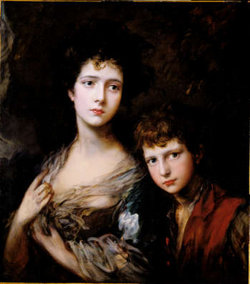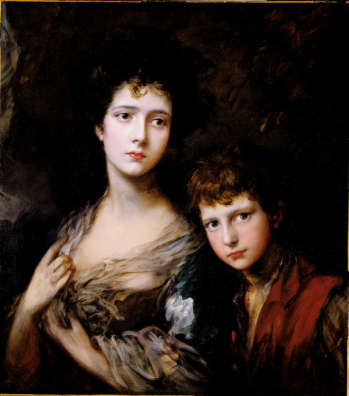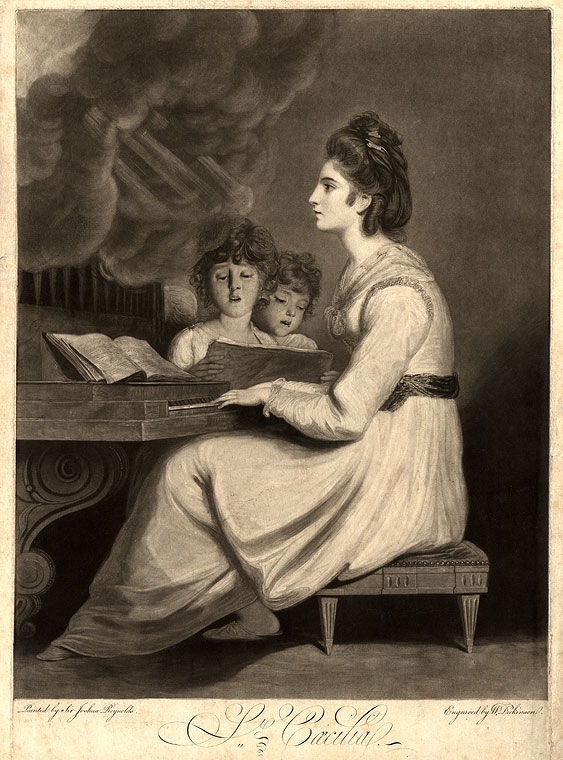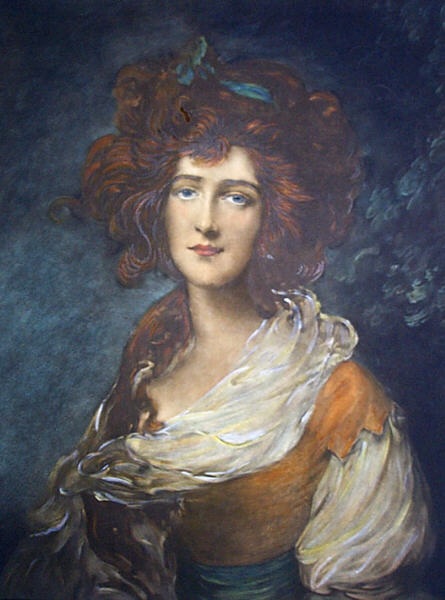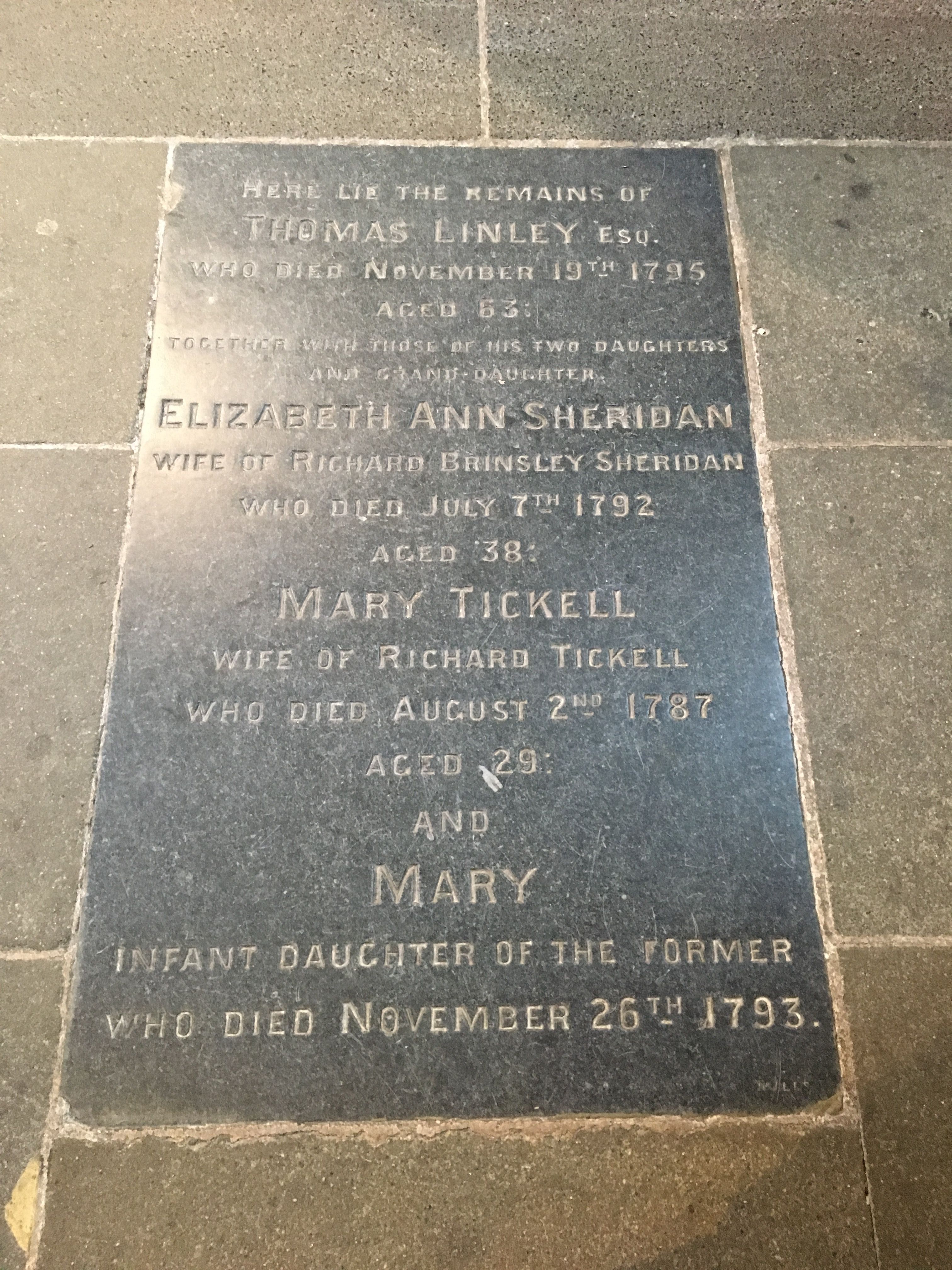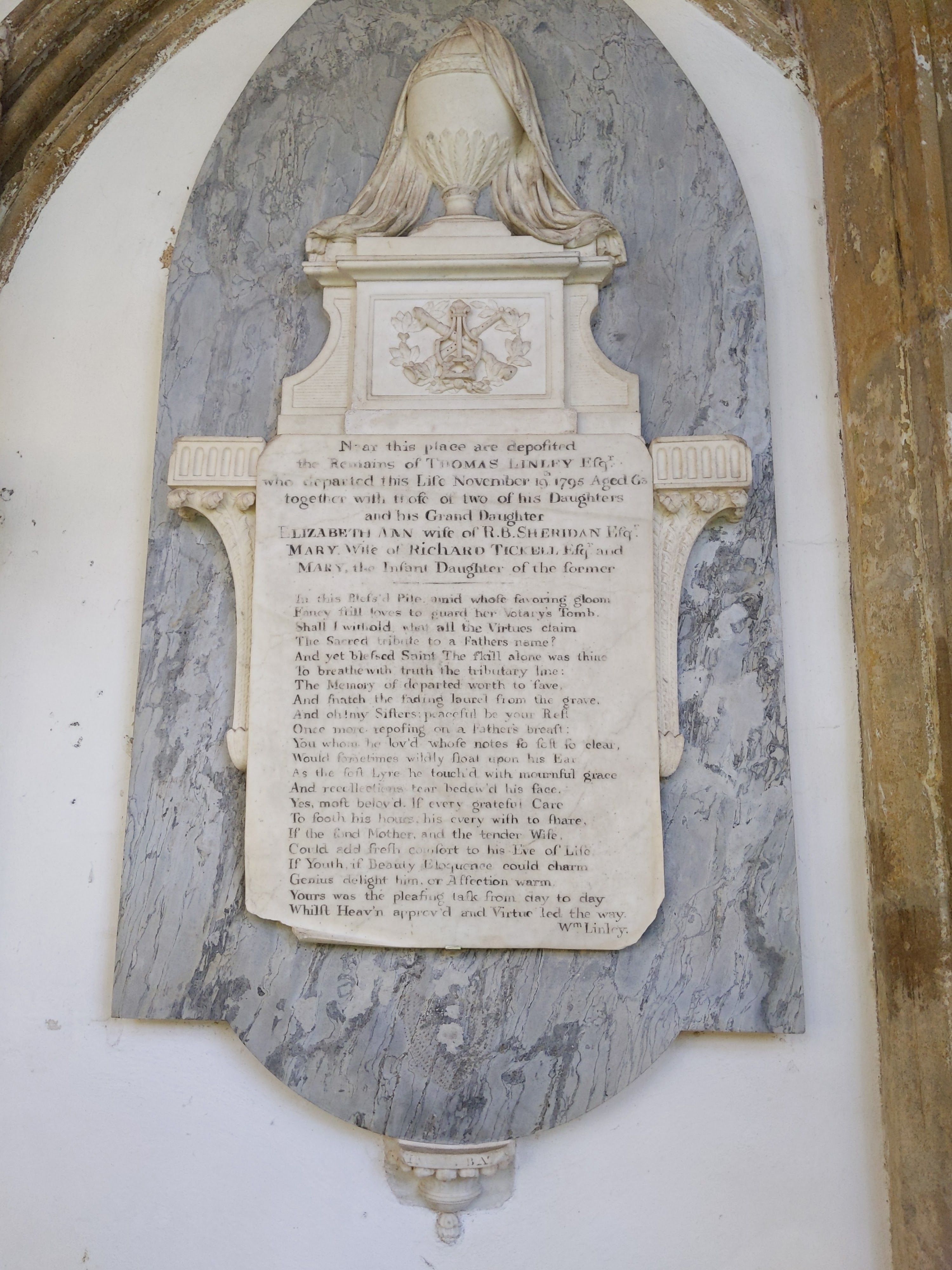At the age of twenty-six Richard Brinsley Sheridan "had in the previous three years married one of the most beautiful women in England, fathered a healthy child, taken control of a great theatre, and written three of the most successful plays of the century." What else could he do but go into Parliament? He did, and served for more than three decades with intelligence, liberal principles, and a certain amount of guile. It was an extraordinary career for a Celtic Irishman without major family connections or independent fortune. That Sheridan died poor, disillusioned, and a bit mad is not surprising. The social and political world that Mr. O'Toole ably reconstructs was as savage as our own.
Elizabeth Linley Sheridan was several times pregnant with her husband. On May 6, 1777 she delivered a stillborn child. At age 37 she had a daughter Mary Sheridan, probably the child of Lord Edward Fitzgerald. Elizabeth seems to have engaged in an affair with Fitzgerald in retaliation for her husband's years of philandering. Mary's birth saped Elizabeth's strength and contributed to her death in 1792. Richard Brinsley Sheridan suffered genuine grief at the loss of his wife, and then was doubly stricken by the death of the infant Mary in October of her first year.
ABOUT HER FAMILY:
Jane Austen would, [most likely] have been well-versed in the music of Thomas Linley the Elder (1733-95) (Elizabeth's father). If she had known any of this music, it would have been that of Linley the Elder, who had the highest profile and longest life. Linley began his musical career in Bath, where he taught singing, directed concerts, and composed. He was father of an impressive musical family; five of his twelve children were gifted musicians, and one, Thomas the Younger, Thomas Linley, Jr., was a true musical prodigy. Not only did he start a brilliant career as a violinist at the age of 7, but before his death in a boating accident at age 22, he also composed an astounding amount of finely-crafted music. It is thought that Thomas the Elder wrote "Think Not My Love" as an elegy to his son.
The Linleys were the most important and influential family of musicians in eighteenth-century Bath. Thomas Linley the elder was the son of a builder and carpenter who moved to the city in the late 1740s to take advantage of the building boom. He became a harpsichordist, singing teacher and composer, and started to direct concerts there in the mid 1750s, gradually involving his talented children in them: Elizabeth, Mary and Maria were precociously gifted singers, while Thomas junior played a violin concerto in Bristol at the age of eight. In 1776 he became one of the managers of the Drury Lane Theatre and the family moved to London.
Her father, from Wikipedia:
Thomas Linley (17 January 1733 – 19 November 1795), English musician, was born in Badminton, Gloucestershire, and studied music in Bath, where he settled as a singing-master and conductor of the concerts.
From 1774 he was engaged in the management at Drury Lane theatre, London, composing or compiling the music of many of the pieces produced there, besides songs and madrigals, which rank high among English compositions. In 1786 he collaborated with John Burgoyne on the successful Richard Coeur de lion.
Children:
With his wife Mary Johnson, he had 12 children, 7 of whom went on to musical or theatrical careers:
Elizabeth Ann Linley (1754–1792), his eldest daughter, wife of Richard Brinsley Sheridan
Thomas Linley the younger (1756–1778), his eldest son, composer and noted violinist
Mary Linley (1758–87), married playwright Richard Tickell in 1780.
Samuel Linley (1760–1778), second son, singer and oboe player
Maria Linley (1763–84), singer.
Ozias Thurston Linley (1765–1831), minor canon at Norwich and organist at Dulwich
William Linley, (1771–1835), composer of glees and songs and writer
The lovely Mrs Sheridan was always sickly and was cherished by her charming, somewhat rakish husband, although he found it impossible to remain faithful. The couple also had the misfortune to suffer several miscarriages, which were a great source of grief to them both.
Poor Elizabeth lived a sad life: universally admired for her gentle, sweet ways, beautiful face and extensive talents and yet feeling miserable and unappreciated because of the faithlessness of the man that she adored and had risked scandal and social ostracism for.
Eliza died in 1792. Their son was Thomas and Eliza's illegitimate daughter Mary was treated as a Sheridan. In 1795 Richard married Hester Ogle and they had a son called Charles. Richard's great granddaughter Marcia Caroline Sheridan married Francis Thynne, son of Lord John Thynne, Sub-Dean of Westminster, in the Abbey on 30 June 1864.
One of the most beautiful and musically-gifted women of the late 18th century was Elizabeth Linley. Elizabeth, or Betsy (and even Eliza on occasion) as she was commonly known, was born in 1754 to the composer Thomas Linley and his wife Mary. Together, Thomas and Mary raised their twelve children to be just as musically talented as themselves. Think: Von Trapp family of Bath. Adorable little Betsy would stand outside the Pump Room selling tickets to her father's concerts. Betsy grew gracefully into a stunning Soprano and soon drew her own crowds in with her beautiful voice. By the time Betsey was barely fourteen she had all the guys drooling over her. She had a tall, slim figure, dark hair, and gorgeous porcelain skin. Thomas Gainsborough took notice of her right away. The artist had painted more than one portrait of the musical Linleys but he especially took notice of Betsy. His many portraits of her, flaunt her natural beauty.
Among the many admirers and young men begging for Betsey's hand was twenty year-old Richard Brinsley Sheridan. Sheridan was perhaps more interested in the chase, and the prize at the end was something he could rub in everyone's face. However, a certain Walter Long stood in his way. Long was really wealthy and about four times the age of Betsy. Thomas Linley pressured his daughter into the match for both the money and for the assurance than she would retire from the stage. God forbid she become an actress! The two were about to marry when Long randomly cut off the engagement, causing Thomas to fly into a rage. Rumors surfaced that Betsy had begged him to break it off. The whole drama resulted in a comedy to premiere at the Haymarket Theater called The Maid of Bath.
Another drama quickly followed Betsy's broken engagement with Thomas Long. Sheridan saw his chance and swept Betsy off her feet. She agreed to marry him and the two eloped to France in 1772. Since both were underage, the marriage was invalid, and neither father approved. To save his daughter's reputation Thomas gave his blessing a month later and the two were accepted into polite society as a very talented and good-looking young couple.
While absconding away to France Betsy became very sick and almost died. Sheridan began to realize just how much Betsy meant to him and how he truly did love her, she wasn't just a prize anymore. Although Betsy survived, her illness was to be a precursor to the many that would follow throughout her life. Miscarriages soon burdened the new couple and it wasn't long before Sheridan began wandering into other women's beds. Betsy was devastated; the man she had chosen above others and at a huge risk, couldn't even be faithful to her. Still, they attended the political events and masquerades and men still marveled at her.
It was only a matter of time before Betsy finally had the courage to have her own affair. Her choice: the hunky Lord Edward Fitzgerald. Unfortunately the affair resulted in a pregnancy. Not only would her infidelity be discovered, it would put her life at serious risk. When Sheridan found out he had an usual reaction for a Georgian male with a big ego: he blamed himself. Instead of casting her out, he spent more time with her and helped her through the pregnancy which proved to be difficult. In fact after Eliza managed to deliver a baby girl her health depleted further and she succumbed to tuberculosis.
Betsy was dying and both she and Sheridan knew it. They went to Bristol in hopes that the hot wells would improve her health. Sheridan tried to support his wife but seeing her dying in front of him torn him up from the inside. One night he found her playing piano, "with tears dripping on her thin arms," a shadow of her former self. Not long afterward Elizabeth died. Sheridan, in tears, held her hand, while she told him to stop crying or to leave the room, for she could not bear the sight when she needed fortitude. The guilt after her death sent Sheridan into the realms of madness. He wasn't the only one to morn her. The crowds at her funeral were so large that the carriage could barely get through the street to Wells Cathedral. Everyone crowded one last time to pay tribute to the maid of Bath whose voice was now silenced forever.
________
Elizabeth Ann Linley, daughter of Thomas Linley, married in 1773. Elizabeth was a renowned singer and beauty, a painting of whom, entitled "Mrs. Richard Brinsley Sheridan" by Thomas Gainsborough, now hangs in the National Gallery of Art, in Washington D.C. Elizabeth died of tuberculosis in 1792.
At the age of twenty-six Richard Brinsley Sheridan "had in the previous three years married one of the most beautiful women in England, fathered a healthy child, taken control of a great theatre, and written three of the most successful plays of the century." What else could he do but go into Parliament? He did, and served for more than three decades with intelligence, liberal principles, and a certain amount of guile. It was an extraordinary career for a Celtic Irishman without major family connections or independent fortune. That Sheridan died poor, disillusioned, and a bit mad is not surprising. The social and political world that Mr. O'Toole ably reconstructs was as savage as our own.
__________
We conclude the interesting trend of Jane Austen's reading playwrights who had strong ties to the clergy. Not surprising for the daughter of a minister. Colman's play mentioned by Jane Austen was Heir at Law. Born to a family with a theater history, Richard Brinsly Sheridan was not a man with strong connections to the clergy. He eloped with a woman after fighting two duels for her. He later married her but not until he had spent a number of years living with her out of wedlock. His education was conducted in Bath and London. In essence, the streets of the city educated him. Jane Austen mentioned two of his plays, The Rivals and School for Scandal. The Rivals is the story of disguised suitors, wagging and exaggerating tongues (it was probably Mrs. Norton who objected to this play), and woman who refuse men they love on the basis on the excess of money. The play School for Scandal relates forbidden love, deceit, cheating spouses, and beautifully charming villains. The way this play captures the language of its time period has been compared to the way Shakespeare captured the Elizabethan language.
At the age of twenty-six Richard Brinsley Sheridan "had in the previous three years married one of the most beautiful women in England, fathered a healthy child, taken control of a great theatre, and written three of the most successful plays of the century." What else could he do but go into Parliament? He did, and served for more than three decades with intelligence, liberal principles, and a certain amount of guile. It was an extraordinary career for a Celtic Irishman without major family connections or independent fortune. That Sheridan died poor, disillusioned, and a bit mad is not surprising. The social and political world that Mr. O'Toole ably reconstructs was as savage as our own.
Elizabeth Linley Sheridan was several times pregnant with her husband. On May 6, 1777 she delivered a stillborn child. At age 37 she had a daughter Mary Sheridan, probably the child of Lord Edward Fitzgerald. Elizabeth seems to have engaged in an affair with Fitzgerald in retaliation for her husband's years of philandering. Mary's birth saped Elizabeth's strength and contributed to her death in 1792. Richard Brinsley Sheridan suffered genuine grief at the loss of his wife, and then was doubly stricken by the death of the infant Mary in October of her first year.
ABOUT HER FAMILY:
Jane Austen would, [most likely] have been well-versed in the music of Thomas Linley the Elder (1733-95) (Elizabeth's father). If she had known any of this music, it would have been that of Linley the Elder, who had the highest profile and longest life. Linley began his musical career in Bath, where he taught singing, directed concerts, and composed. He was father of an impressive musical family; five of his twelve children were gifted musicians, and one, Thomas the Younger, Thomas Linley, Jr., was a true musical prodigy. Not only did he start a brilliant career as a violinist at the age of 7, but before his death in a boating accident at age 22, he also composed an astounding amount of finely-crafted music. It is thought that Thomas the Elder wrote "Think Not My Love" as an elegy to his son.
The Linleys were the most important and influential family of musicians in eighteenth-century Bath. Thomas Linley the elder was the son of a builder and carpenter who moved to the city in the late 1740s to take advantage of the building boom. He became a harpsichordist, singing teacher and composer, and started to direct concerts there in the mid 1750s, gradually involving his talented children in them: Elizabeth, Mary and Maria were precociously gifted singers, while Thomas junior played a violin concerto in Bristol at the age of eight. In 1776 he became one of the managers of the Drury Lane Theatre and the family moved to London.
Her father, from Wikipedia:
Thomas Linley (17 January 1733 – 19 November 1795), English musician, was born in Badminton, Gloucestershire, and studied music in Bath, where he settled as a singing-master and conductor of the concerts.
From 1774 he was engaged in the management at Drury Lane theatre, London, composing or compiling the music of many of the pieces produced there, besides songs and madrigals, which rank high among English compositions. In 1786 he collaborated with John Burgoyne on the successful Richard Coeur de lion.
Children:
With his wife Mary Johnson, he had 12 children, 7 of whom went on to musical or theatrical careers:
Elizabeth Ann Linley (1754–1792), his eldest daughter, wife of Richard Brinsley Sheridan
Thomas Linley the younger (1756–1778), his eldest son, composer and noted violinist
Mary Linley (1758–87), married playwright Richard Tickell in 1780.
Samuel Linley (1760–1778), second son, singer and oboe player
Maria Linley (1763–84), singer.
Ozias Thurston Linley (1765–1831), minor canon at Norwich and organist at Dulwich
William Linley, (1771–1835), composer of glees and songs and writer
The lovely Mrs Sheridan was always sickly and was cherished by her charming, somewhat rakish husband, although he found it impossible to remain faithful. The couple also had the misfortune to suffer several miscarriages, which were a great source of grief to them both.
Poor Elizabeth lived a sad life: universally admired for her gentle, sweet ways, beautiful face and extensive talents and yet feeling miserable and unappreciated because of the faithlessness of the man that she adored and had risked scandal and social ostracism for.
Eliza died in 1792. Their son was Thomas and Eliza's illegitimate daughter Mary was treated as a Sheridan. In 1795 Richard married Hester Ogle and they had a son called Charles. Richard's great granddaughter Marcia Caroline Sheridan married Francis Thynne, son of Lord John Thynne, Sub-Dean of Westminster, in the Abbey on 30 June 1864.
One of the most beautiful and musically-gifted women of the late 18th century was Elizabeth Linley. Elizabeth, or Betsy (and even Eliza on occasion) as she was commonly known, was born in 1754 to the composer Thomas Linley and his wife Mary. Together, Thomas and Mary raised their twelve children to be just as musically talented as themselves. Think: Von Trapp family of Bath. Adorable little Betsy would stand outside the Pump Room selling tickets to her father's concerts. Betsy grew gracefully into a stunning Soprano and soon drew her own crowds in with her beautiful voice. By the time Betsey was barely fourteen she had all the guys drooling over her. She had a tall, slim figure, dark hair, and gorgeous porcelain skin. Thomas Gainsborough took notice of her right away. The artist had painted more than one portrait of the musical Linleys but he especially took notice of Betsy. His many portraits of her, flaunt her natural beauty.
Among the many admirers and young men begging for Betsey's hand was twenty year-old Richard Brinsley Sheridan. Sheridan was perhaps more interested in the chase, and the prize at the end was something he could rub in everyone's face. However, a certain Walter Long stood in his way. Long was really wealthy and about four times the age of Betsy. Thomas Linley pressured his daughter into the match for both the money and for the assurance than she would retire from the stage. God forbid she become an actress! The two were about to marry when Long randomly cut off the engagement, causing Thomas to fly into a rage. Rumors surfaced that Betsy had begged him to break it off. The whole drama resulted in a comedy to premiere at the Haymarket Theater called The Maid of Bath.
Another drama quickly followed Betsy's broken engagement with Thomas Long. Sheridan saw his chance and swept Betsy off her feet. She agreed to marry him and the two eloped to France in 1772. Since both were underage, the marriage was invalid, and neither father approved. To save his daughter's reputation Thomas gave his blessing a month later and the two were accepted into polite society as a very talented and good-looking young couple.
While absconding away to France Betsy became very sick and almost died. Sheridan began to realize just how much Betsy meant to him and how he truly did love her, she wasn't just a prize anymore. Although Betsy survived, her illness was to be a precursor to the many that would follow throughout her life. Miscarriages soon burdened the new couple and it wasn't long before Sheridan began wandering into other women's beds. Betsy was devastated; the man she had chosen above others and at a huge risk, couldn't even be faithful to her. Still, they attended the political events and masquerades and men still marveled at her.
It was only a matter of time before Betsy finally had the courage to have her own affair. Her choice: the hunky Lord Edward Fitzgerald. Unfortunately the affair resulted in a pregnancy. Not only would her infidelity be discovered, it would put her life at serious risk. When Sheridan found out he had an usual reaction for a Georgian male with a big ego: he blamed himself. Instead of casting her out, he spent more time with her and helped her through the pregnancy which proved to be difficult. In fact after Eliza managed to deliver a baby girl her health depleted further and she succumbed to tuberculosis.
Betsy was dying and both she and Sheridan knew it. They went to Bristol in hopes that the hot wells would improve her health. Sheridan tried to support his wife but seeing her dying in front of him torn him up from the inside. One night he found her playing piano, "with tears dripping on her thin arms," a shadow of her former self. Not long afterward Elizabeth died. Sheridan, in tears, held her hand, while she told him to stop crying or to leave the room, for she could not bear the sight when she needed fortitude. The guilt after her death sent Sheridan into the realms of madness. He wasn't the only one to morn her. The crowds at her funeral were so large that the carriage could barely get through the street to Wells Cathedral. Everyone crowded one last time to pay tribute to the maid of Bath whose voice was now silenced forever.
________
Elizabeth Ann Linley, daughter of Thomas Linley, married in 1773. Elizabeth was a renowned singer and beauty, a painting of whom, entitled "Mrs. Richard Brinsley Sheridan" by Thomas Gainsborough, now hangs in the National Gallery of Art, in Washington D.C. Elizabeth died of tuberculosis in 1792.
At the age of twenty-six Richard Brinsley Sheridan "had in the previous three years married one of the most beautiful women in England, fathered a healthy child, taken control of a great theatre, and written three of the most successful plays of the century." What else could he do but go into Parliament? He did, and served for more than three decades with intelligence, liberal principles, and a certain amount of guile. It was an extraordinary career for a Celtic Irishman without major family connections or independent fortune. That Sheridan died poor, disillusioned, and a bit mad is not surprising. The social and political world that Mr. O'Toole ably reconstructs was as savage as our own.
__________
We conclude the interesting trend of Jane Austen's reading playwrights who had strong ties to the clergy. Not surprising for the daughter of a minister. Colman's play mentioned by Jane Austen was Heir at Law. Born to a family with a theater history, Richard Brinsly Sheridan was not a man with strong connections to the clergy. He eloped with a woman after fighting two duels for her. He later married her but not until he had spent a number of years living with her out of wedlock. His education was conducted in Bath and London. In essence, the streets of the city educated him. Jane Austen mentioned two of his plays, The Rivals and School for Scandal. The Rivals is the story of disguised suitors, wagging and exaggerating tongues (it was probably Mrs. Norton who objected to this play), and woman who refuse men they love on the basis on the excess of money. The play School for Scandal relates forbidden love, deceit, cheating spouses, and beautifully charming villains. The way this play captures the language of its time period has been compared to the way Shakespeare captured the Elizabethan language.
Gravesite Details
Her only child Thomas is buried in her grave.
Family Members
Advertisement
Records on Ancestry
Sponsored by Ancestry
Advertisement
